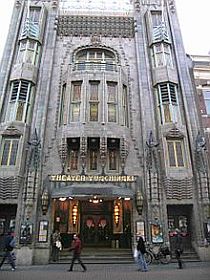


IDFA Opening

The opening ceremony of the 25th edition of idfa took place in the Tuschinski theatre close to Rembrandtsplein in Amsterdam. The mother of the festival, as she is called, flamboyant Ally Derks made the opening speech full of passion and proudness for what she and her team have been doing in the 25 years that have passed – my comment: built up the most important yearly meeting point for professionals from all over the world and succeeded to create a huge audience that in the coming 10 days will fight to get tickets for the screenings of which many are already sold out.
BUT, and there was a big BUT that was coming back again and again in the speech of Derks – the government’s announcement of cuts in funding for documentaries through Mediafonds (The Dutch Cultural Media Fund) and the broadcasters IKON and Human TV.
“These cuts are very, very serious. They de-stabilize the whole industrial structure. The jobs, the suppliers, the families they support. All will be lost. Clearly 80 percent of all the Dutch films we are showing at IDFA have been supported by the Mediafonds. Where will this lead? To dark screens for Dutch documentary?”. The plan of the government is to close the fund by 2017 and to let the broadcasters do the support!
(Facts about the The Dutch Cultural Media Fund: This Fund currently provides approximately €16 million annually for documentary, fiction, digital projects, radio and talent development. Of this, €8 million is devoted to documentary. 40 titles at this year’s IDFA were made with the Fund’s support, among them the opening film Wrong Time Wrong Place by John Appel. In all, the Fund backs around 70 documentaries a year.)
Back to the speech: “You know, films are a lot like flowers. There are many people who love tulips. Others like roses. Some even like weeds. But you can
love orchids (orkids), too. And you can enjoy them all in your garden, or together in a vase on your table…
Now, to celebrate this beautiful diversity, IDFA is bringing together 2500 documentary professionals and guests, more than 320 films and 200,000 members of the public. In the early years, we had only 400 films to consider for our selection. Nowadays, advances in technology and the democratization of production means we need to consider 3600 films each year. The gatekeepers and gateways have opened up. Films are rushed to IDFA from almost every country on Earth.”
The opening film by John Appel, “Wrong Time Wrong Place” was meant to be an essay about “A look at the role of chance in our apparently manipulatable existence” but ends up being just another, pretty sentimental and conventional film based on survivors memories on Utøya in Norway July 2011, with fine characters, who once in a while reflect on “what if” I had done this or that, or been there just a moment before. Rather disappointing from a director who did “The Player”.
http://www.idfa.nl/industry/daily.aspx
http://www.idfa.nl/industry/tags/project.aspx?id=5ebb228b-20db-427f-9fc5-066e8aef2e12
NB! Tuschinski Theatre: commissioned by Abraham Icek Tuschinski in 1921 at a cost of 4 million guilders. The interior and exterior are a spectacular mix of styles, as designed by Hijman Louis de Jong; Amsterdam School